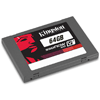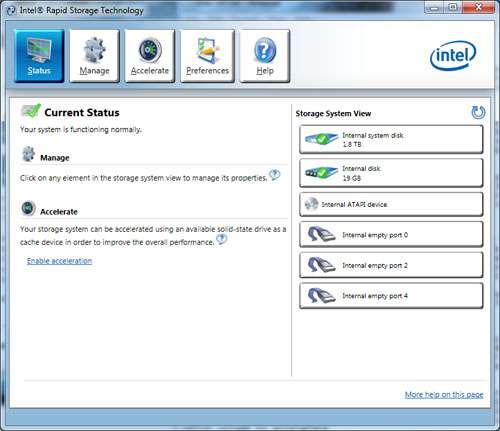- Qualcomm Launches Snapdragon 4 Gen 2 Mobile Platform
- AMD Launches Ryzen PRO 7000 Series Mobile & Desktop Platform
- Intel Launches Sleek Single-Slot Arc Pro A60 Workstation Graphics Card
- NVIDIA Announces Latest Ada Lovelace Additions: GeForce RTX 4060 Ti & RTX 4060
- Maxon Redshift With AMD Radeon GPU Rendering Support Now Available
Intel Z68 SSD Disk Caching Showdown

When we tested out Intel’s ‘Smart Response Technology’ last month, we liked what we saw. But at $110 for a 20GB SLC SSD, we wondered if a larger, more cost-effective option could still make the best use of the technology. With that, we’re pitting Kingston’s SSDNow V+100 64GB drive, at $150, against Intel’s, to see if we retain SRT’s effectiveness.
Page 5 – Final Thoughts
Going back to our CrystalDiskMark results, despite it being a synthetic benchmark, the numbers on the Kingston drive with maximum acceleration enabled simply do not fall into line. If this were the only case of inconsistencies, I might be fine with it but the strange numbers from testing with dBpoweramp calls into question whether the issue is with the SSD or RST itself.
Also, I have to mention the slight decrease in numbers in many tests when maximum acceleration is used. I can understand that these numbers really rely on the test itself and whether or not data is written, however if data is not written, shouldn’t the scores remain constant to a certain degree?
So what drive will work the best for users? Well, there’s no single answer but by asking another question the answer becomes a bit clearer; what information will be cached to the SSD? If there are a lot of small files that need to be accessed, Intel is the winner whereas if large files need to be processed, Kingston is the way to go. It all boils down to the work being done and what types of files are being accessed and written on the cache drive.
Most users will notice a general performance boost and yes, the Kingston drive does offer a nice alternative since there is more space to cache additional data. If the user so desires, they could create two partitions, using one for caching and one for storage, giving them a bit more flexibility.
I can’t sit here and say that the Intel drive is a bad deal though, because it does offer some blistering fast numbers, and while using it during the first round of testing in the original article, it did help to speed up overall system response with everything from start up time to opening windows.
If there was a black or white answer to all of this, I would be more happy to give it, but for now the best I can do is grey. You didn’t think I would make it this easy, did you?
Discuss this article in our forums!
Have a comment you wish to make on this article? Recommendations? Criticism? Feel free to head over to our related thread and put your words to our virtual paper! There is no requirement to register in order to respond to these threads, but it sure doesn’t hurt!
Support our efforts! With ad revenue at an all-time low for written websites, we're relying more than ever on reader support to help us continue putting so much effort into this type of content. You can support us by becoming a Patron, or by using our Amazon shopping affiliate links listed through our articles. Thanks for your support!





